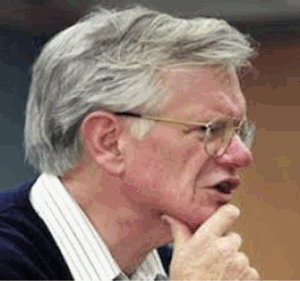
Professor David Orrin Morgan, prominent scholar of Middle Eastern History, passed away on 23 October 2019. He is survived by his wife Johanna, daughters Judith, Rosalind, and Eleanor, and grandson Owen. His family, friends, and former students mourn his passing at age seventy-four.
After graduating from Oxford University in 1966, David Morgan completed his doctorate at the University of London in 1977. Dr. Ann Lambton supervised his PhD thesis, entitled “Aspects of Mongol Rule in Persia.” From 1973 to 1974, he worked as a fellow at the British Institute of Persian Studies in Tehran. Morgan’s love of Mongol and Persian history led him to publish two books that have become standards in the field. The Mongols was first published by Blackwell in 1986, and was reprinted in 2007. The first edition of his second book, Medieval Persia: 1040–1797, was published by Routledge in 1988, with a second edition printed in 2015. He will also be remembered for his outstanding editorial work for the Journal of the Royal Asiatic Society, The New Cambridge History of Islam (vol. 3), and the book series Cambridge Studies in Islamic Civilization. Morgan contributed much to the field of Middle Eastern History as both a writer and an editor.
After a twenty-year career teaching at the University of London’s School of Oriental and African Studies (SOAS), Morgan accepted a Professorship at the University of Wisconsin, Madison (UW-Madison). He moved to Madison Wisconsin in 2000, where he remained as a professor until his retirement in 2010. In 2013, he returned to England with his family. Morgan was a mentor and a role model for his former UW-Madison graduate students such as myself. I first met Morgan in 2001, as a first-year graduate student. I was moved by his reaction to the events of 9-11. He spoke on local television and radio shows about the need for informed dialogue, and warned against knee-jerk reactions to violence. While he was a scholar of the pre-modern world, he often brought us articles about current events and encouraged us to place them in a larger historical context.
In addition to his duties as my academic advisor, I worked as his administrative assistant through the auspices of the UW-Madison Middle East Studies Program. As both a teacher and a supervisor, he possessed the rare gift of erudition combined with humor and clarity. He often augmented his seminars with humorous stories from his own travels in Iran and Afghanistan. Possessed of an encyclopedic knowledge of Middle Eastern historiography, Morgan was an excellent resource for his PhD students. He listened closely to our ideas and provided expert feedback.
On a personal level, David Morgan will be remembered for his warmth and expansive personality. He often held social gatherings at his home for graduate students. Proud of his Welsh heritage, he flew a Welsh flag outside his house on a quiet Wisconsin street. Morgan loved classical music, books, and cats. While he proudly gave his students a tour of his vast home library, he was equally delighted to introduce us to his newest cat, a stray adopted from the local humane society. He will be remembered as much for his kindness as his scholarship. Morgan’s former students are better historians and better people after having known him.


